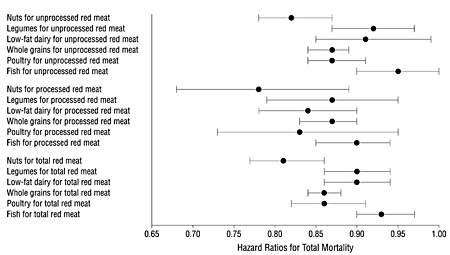Research Shows Eating Red Meat Increases Mortality Risk: More Meat, More Risk
A large new study of more than 37,000 men, whose dietary habits were followed for about 22 years, and 83,000 women who were followed for about 28 years has provided the strongest signal yet of the health problems associated with eating unprocessed and processed red meat. The conclusion from the study was that eating daily portions of unprocessed and processed red meats increased the risk of mortality. The more meat eaten the higher the risk (see the image below).
Red meat substitutes such as poultry, nuts, fish, legumes, low-fat dairy products, and whole grains, produced lower mortality risks. This is a further boost to those advocating the health of vegetarian and Mediterranean style diets. The researchers suggested that the promotion of replacement for red meat with the alternative animal and vegetable protein may lower the mortality risk and increase the life expectancy of middle age people.


The study of more than 120,000 subjects was conducted using survey techniques. Each subject was asked to complete a survey concerning their eating habits every 4 years over the 20-30 year period. The study also showed that:
- substituting nuts for red meat (in a vegetarian or vegan diet) reduced total mortality risk by about 19 %
- substituting using whole grains or poultry reduced the risk by 14 %
- substituting using fish reduced the risk by 7%.
The authors of the study estimated that encouraging the participants to halve their red meat consumption every day for the substitutes could have reduced the overall mortality of the subjects during the 20-30 year period by 7-9 %.
Processed red meat has been implicated in a variety of studies to be unhealthy. It contains many doubtful ingredients such as sodium, saturated fat, nitrites, preservatives and some suspected carcinogens that are associated with chronic ailments including cancer and heart disease.


It has been reported in other studies that red meat intake was associated with an increased risk of coronary heart disease. Red meat intake has been associated with increased risks of colorectal cancer and several other cancers.
Other studies have shown that deaths related to smoking and obesity are partially preventable through changes in lifestyles.
Seventh Day Adventist Vegetarians Live Longer
In an earlier study, published in the Archives of Internal Medicine in 2001, found that Seventh Day Adventists, who generally have healthier habits than the general population, and don't eat meat, have a longer life expectancy at the age of 30 years, than the average person in the American population. The study found that Adventist men lived an average of about 7 years longer, and women about 4 years longer than those in the general population. The vegetarian diet of Adventists, body weight, exercise, eating nuts, cigarette smoking and hormone replacement therapy (HRT) all played a part in the benefits that were reported.
Sugar-Laden Beverages increases risk of Heart Disease
A recent study, published in the journal - Circulation, showed that men who drank sugar-laden beverages daily had a 20 % higher risk of heart disease than those who did not consume these drinks, or who only consumed 2 of these beverages a week. The study followed the diets of more that 42,000 men, over a 22 year period.
